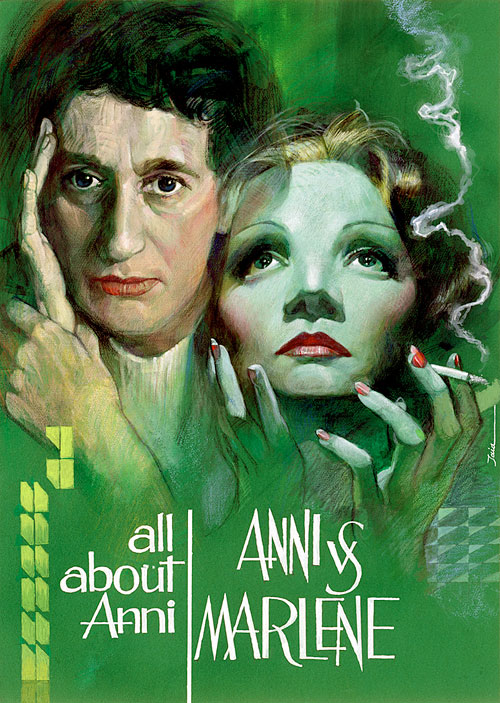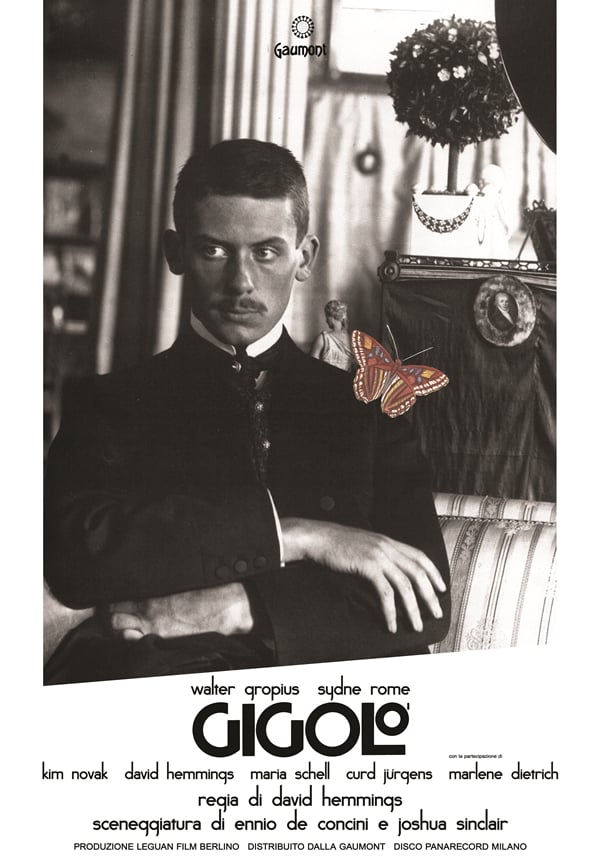Reviews
The Real Unreal Dazzle of Francesco Vezzoli at MOCA LA
The Italian master of high and low culture continues to shock and enthrall.

The Italian master of high and low culture continues to shock and enthrall.

Yasmine Mohseni


Francesco Vezzoli, Gigolo (2007). Photo: Courtesy Galerie Yvon Lambert, Paris.
Movie Stars! Glamour! Hollywood! Welcome to Milan-based artist Francesco Vezzoli’s universe, where you might find Natalie Portman and Michelle Williams physically battling it out over a bottle of fake perfume called Greed, or Milla Jovovich partaking in a bacchanalian party in the trailer of the fictitious film Caligula, or even perhaps Eva Mendes seductively dancing in a faux advertisement for Paris’s Jeu de Paume. Vezzoli undeniably believes that bigger and flashier is always better. And this is precisely what we see at his recently opened solo exhibition Cinema Vezzoli at MOCA Los Angeles, on view until August 11, 2014.
Cinema Vezzoli is the second of a three-part multi-institutional exhibition titled The Trinity, which investigates perennial themes in Vezzoli’s work, most notably celebrity-driven culture and its place in the public imagination.
The first part of the exhibition was installed at the National Museum of XXI Century Art (MAXXI) in Rome in 2013 as a tribute to the city’s rich art history. The final part is slated to open this fall at MoMA PS1, at which time the artist hopes to have transported a dilapidated Italian church from Italy to the intersection of Jackson and 46th Avenues.
Cinema Vezzoli, meanwhile, is Vezzoli’s love affair with cinema.
The exhibition consists of five interconnected sections showing sculpture, embroidery, posters, video, and tapestry. The works on view have been predominately borrowed from private collections, institutions, and galleries, with the exception of Gioventú Bruciata, (2014) a set of four new photos created especially for MOCA and featuring the stars from Rebel Without a Cause (1955).
The whole show begins with the work Fine (2004), a silkscreen print announcing the end of a film in Italian and ends with Sono Come Tu Mi Vuoi, (2007) a huge tapestry depicting the opening screen shot of Greta Garbo’s 1932 film As You Desire Me. From Fine to Sono Come Tu Mi Vuoi, Cinema Vezzoli is an immersive exhibition that plunges the visitor into a world of glitz and glamour, complete with a red carpet, plush velour theater curtains, and cushy cinema seats in lieu of the traditional museum bench.
Photos and needlepointed compositions of teary stars like Katharine Hepburn, Spencer Tracy, and James Dean look out from star-shaped frames while a powerful image of a politico glamour-puss Jane Fonda dominates the wall of a large hallway. A black box theater constructed in the center of the MOCA galleries especially for the exhibition projects a 50-minute compilation of original Vezzoli’s films from 1999 to 2009, including a faux posthumous documentary on the artist inspired by the E! Network’s series “True Hollywood Story.”
At first glance the glossy and produced aspect of the show can be off-putting. But in reality, this is a nuanced exhibition, demanding the viewer’s active participation.
Vezzoli’s talents lie in his sleight of hand and ability to mock Hollywood’s smoke and mirrors through the participation of the community’s most prominent members. He has worked with filmmakers and stars like Roman Polanski, Lady Gaga, Marisa Berenson, Lauren Bacall, Helen Mirren, Sharon Stone, and Courtney Love, and they’ve all donated their time, the artist has said. Vezzoli’s goal is to conjure ambiguity through high-caliber production, leaving the viewers somewhat confused by what they’re looking at. Questions might bubble up: “Where can I get a bottle of the perfume Greed?” or “When is the move Caligula coming out?”
“Did Vezzoli really die?”
Cinema Vezzoli exists in a slippery, absurd space where the worlds of cinema, stars, and pop culture are lovingly deconstructed.
The ultimate example is the mischievously clever fake movie poster inspired by David Bowie’s film Just A Gigolo (1978). In Vezzoli’s version, the Gigolo is German architect and Bauhaus founder Walter Gropius. This conceptual gesture mixes high and low, with Vezzoli appropriating an important figure of cultural history and juxtaposing him with a Pop culture icon.
Who is to say that Gropius’s impact on culture is more or less legitimate than that of Ziggy Stardust’s? Vezzoli certainly won’t tell you. He wants you to make up your own mind.